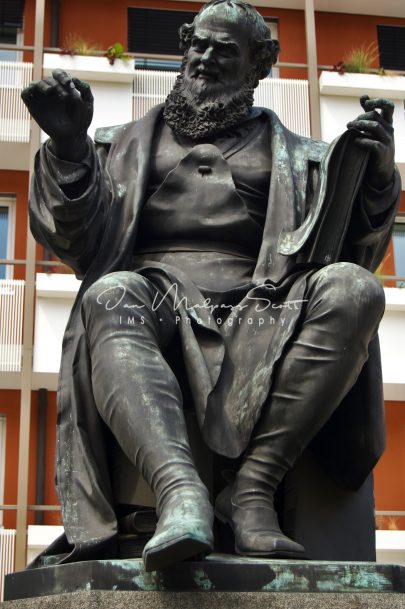![]()
Statue of Hans Sachs in Nuremberg, Germany
Hans Sachs (5 November 1494 – 19 January 1576) was a German Meistersinger (“mastersinger”), poet, playwright, and shoemaker.
Hans Sachs was born in Nuremberg (German: Nürnberg). As a child he attended a singing school that was held in the church of Nuremberg. This helped to awaken in him a taste for poetry and music.[1] His father was a tailor. He attended Latin school (German: Lateinschule) in Nuremberg . When he was 14 he took up an apprenticeship as a shoemaker.
After the apprenticeship, at age 17, he was a journeyman and set out on his Journeyman years (Wanderjahre or Walz), that is, travelling about with companions and students. Over several years he worked at his craft in many towns, including Regensburg, Passau, Salzburg, Munich, Osnabrück, Lübeck, and Leipzig.
In 1513 he reached the small town of Wels, where he remained for a time, devoting himself to the cultivation of the fine arts. The Emperor Maximilian I chanced to pass through this town with his dazzling retinue, and the young poet allowed himself to be carried away by the splendour of the court. The prince placed him in the halls of the palace of Innsbruck. Later Hans Sachs quit the court and went to Schatz and Munich.
In the same year, he took up a kind of apprenticeship to become a mastersinger at Munich. Lienhard Nunnenbeck, a linen weaver, was his master. In 1516 he settled in Nuremberg and stayed there for the rest of his life. On 1 September 1519 he married Kunigunde Creutzer (1502–1560). He had seven children, but all died while he was still alive. He married again on 2 September 1561, this time to the young widow Barbara Harscher.
The great event of his intellectual life was the coming of the Reformation; he became an ardent adherent of Luther, and in 1523 wrote in Luther’s honor the poem beginning “The nightingale of Wittenberg, which is heard everywhere” (German: Die wittenbergisch Nachtigall, Die man jetzt höret überall), and four remarkable dialogues in prose, in which his warm sympathy with the reformer was tempered by counsels of moderation. In spite of this, his advocacy of the new faith earned him a reproof from the town council of Nuremberg, and he was forbidden to publish any more “pamphlets or rhymes” (German: Büchlein oder Reimen). It was not long, however, before the council itself openly threw in its lot with the Reformation.


